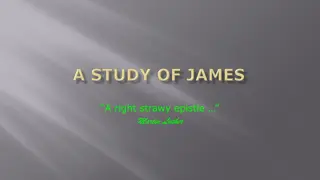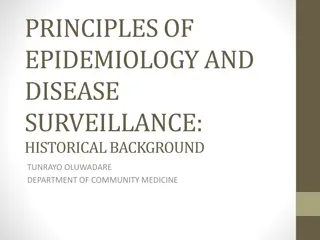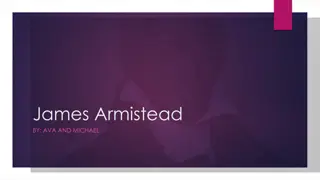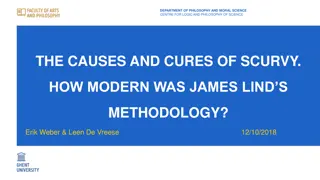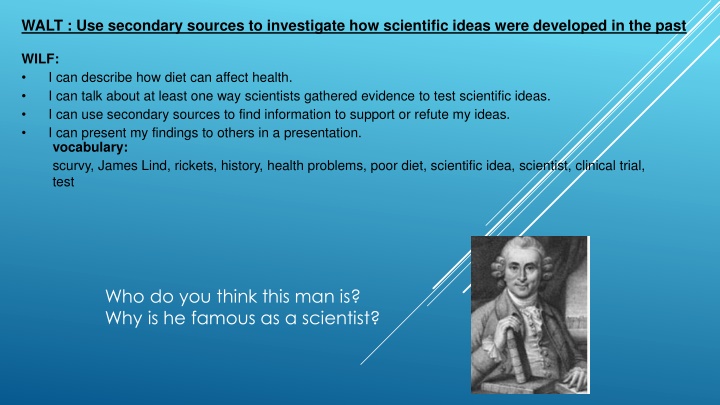
Investigating Historical Scientific Discoveries: James Lind and the Impact of Diet on Health
Explore how scientific ideas were developed in the past through the work of James Lind, a naval doctor who connected diet to diseases like scurvy. Learn about the impact of poor diet on health and the efforts of scientists to understand and prevent diet-related illnesses.
Download Presentation

Please find below an Image/Link to download the presentation.
The content on the website is provided AS IS for your information and personal use only. It may not be sold, licensed, or shared on other websites without obtaining consent from the author. If you encounter any issues during the download, it is possible that the publisher has removed the file from their server.
You are allowed to download the files provided on this website for personal or commercial use, subject to the condition that they are used lawfully. All files are the property of their respective owners.
The content on the website is provided AS IS for your information and personal use only. It may not be sold, licensed, or shared on other websites without obtaining consent from the author.
E N D
Presentation Transcript
WALT : Use secondary sources to investigate how scientific ideas were developed in the past WILF: I can describe how diet can affect health. I can talk about at least one way scientists gathered evidence to test scientific ideas. I can use secondary sources to find information to support or refute my ideas. I can present my findings to others in a presentation. vocabulary: scurvy, James Lind, rickets, history, health problems, poor diet, scientific idea, scientist, clinical trial, test Who do you think this man is? Why is he famous as a scientist?
Look at the pictures and statements on each of these cards have your parents ever said any of these to you? How many of these statements do you think hold any truth and which are old wives tales ?
You can probably see that whilst none of them are scientifically factual, there is some evidence to support a few of the statements, for example, we know that fish contains many vitamins and minerals which are undoubtable good for your brain.
Today you are going to find out about times when we knew less about healthy eating and many people died because of diet-related illnesses. You are going to learn how scientists set about trying to work out what causes particular illnesses and how to avoid them in the first place or cure them if not. Watch the video and read the information on the next page about James Lind. James was a naval doctor who made a link to diet and a disease called scurvy which was suffered by sailors. You will research the problems caused by poor diet in the past can you think of any other diseases that you may have heard of which relate to a poor diet?
https://www.youtube.com/watch?v=y2rEOi6Kyzo http://www.bbc.co.uk/history/historic_figures/lind_ja mes.shtml
These are the names of some other diseases which can be as a result of a lack of something from a person s diet: Rickets Goitre osteoporosis
Task: Ch.1 Open the sheet What did James Lind do and use the information given (and the internet) to answer each of the questions Ch. 2 and 3 presents your findings about scurvy and at least one of the other diet related illnesses to create a presentation. Look at the following slide for all of the details of what to include.
Challenge 3 Choose 2 of the diet related illnesses and include all of the information below in your presentation about them: dates key features of the health problem misconceptions of how they were caused at the time important scientists or researchers who discovered the reasons for the condition how scientists went about testing their scientific idea in practice what we have learned that affects our knowledge of a healthy diet today any current research that indicates this problem is likely to reoccur in their country or elsewhere in the world.




